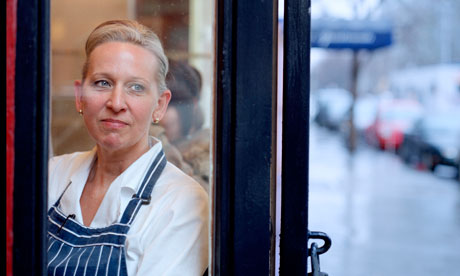
How did you come to write Blood, Bones and Butter?
I spent the first three and a half years resisting, denying that I was writing a memoir and erasing two thirds of what I was writing because in every lit class I've ever taken the category of memoir is dismissed, demeaned, and considered weak, confessional, and "girly". Then I spent another six months savaging what little work I had managed to produce. Then I had a frank conversation with myself in which I admitted that I was not as talented as I wish I was. This gave me the permission to just do my absolute best within my limited skill set. I also made a commitment to write "hospitably", as I have been trained to be in the kitchen – to do everything I could to take care of and to serve the reader as I would take care of and serve a guest in my restaurant. In essence, I did everything I could to remove my own ego and apprehensions and just be the person who – metaphorically speaking – cooks the food and cleans up afterwards.
What was most difficult about it?
How to evoke both the romance and nostalgia of something that I was simultaneously mourning the loss of and regarding with a jaundiced eye, and then to maintain a voice that I could bear to listen to for 85,000 words. I listened to this advice from my friend David Young: "The voice? The voice is you talking to the smartest person you know about everything you hate about the subject with the most compassion for it that you can muster."
What did you most enjoy?
I really started to have fun with the writing when I developed the muscle and discipline to take care of the story in the exact same way I would take care of the food in my restaurant – when I became able to determine what was too "salty", too "rare", too "sandy" about the text in front of me. When I was finally able to view the prose with the same objective evaluation I could have for a plate of food coming down the line on its way to the customer.
How long did it take?
Four years to stare at the damned thing and about a year to actually write it.
What has changed for you since it was first published?
I have much more interesting and honest conversations with strangers within the first few minutes of meeting.
Who's your favourite writer?
That's impossible to nail down – the whole perfection of a book is when you find it and it finds you, just as you are ready to receive its brilliance. I tend to read pretty happily within the great books of the western canon.
What are your other inspirations?
When I have to write about food, I keep John Berger and his Into Their Labours trilogy at the front of my brain, particularly the book Pig Earth. I realise he has nothing to do with food writing whatsoever, but his elemental references to simply "bread" or "wine" or a peasant woman with a fistful of berries staining her rough hand, or the warm milk from the cow whose breathing you can hear through the thin shed wall, or a pot of soup on the fire – well, that is my idea of good food writing.
Give us a writing tip
Don't forget to read your work out loud so you can hear how long the sentences are and where you trip over them; so you can hear exactly when to place a three-word sentence after a 70-word sentence; and so you can hear when you have too many dazzling clevernesses crowded together, calling attention to you the writer and away from the writing, thus alienating the reader and fucking up the story.
What, if anything, would you do differently if you were starting the book again?
I would hire a chef for the restaurant and a nanny for the children so that I wouldn't have had to write while cooking and nursing and trying to run a business. I would have made the writing my full-time priority instead of feverishly scratching it out, guerrilla-style, in the crevices of an already overextended life schedule.
What are you working on now?
A cookbook archiving everything we've been cooking at my restaurant Prune for the past 12 years. What an incredibly friendly and lighthearted contrast it is to just be writing about boiling water and peeling vegetables after all the delving and probing of the memoir.

